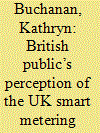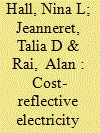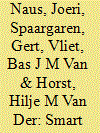|
|
|
Sort Order |
|
|
|
Items / Page
|
|
|
|
|
|
|
| Srl | Item |
| 1 |
ID:
166305


|
|
|
|
|
| Summary/Abstract |
Keeping homes at a comfortable temperature and reducing household fuel bills are priorities for many governments. In the UK, several interventions have been implemented to achieve these objectives. This paper investigates one such policy lever - the Energy Price Cap - to understand if it has been designed and implemented efficiently and equitably. The price cap was introduced for customers on prepayment meters to combat increased levels of fuel poverty and a lack of competition in this group. However, the price cap was based on several assumptions of how energy is used. In this work, we assess how well the price cap accounts for real energy use using smart meter data. Households on economy 7 (EC7) tariffs were found to spend more than those on standard rate tariffs, as EC7 customers use more electricity during peak hours than assumed in government calculations. Additionally, many of the EC7 customers in this sample still use a considerable amount of gas, suggesting the EC7 heating product is either not sufficient, or is not being utilised in a cost-effective manner. Revisions to the input assumptions in government models for EC7 customers would therefore be beneficial in future price cap levels.
|
|
|
|
|
|
|
|
|
|
|
|
|
|
|
|
| 2 |
ID:
150863


|
|
|
|
|
| Summary/Abstract |
Consumer acceptance of smart meters remains crucial in achieving the potential carbon emission reductions offered by advanced metering infrastructures. Given this, the present research used deliberative focus groups to examine what is needed to secure acceptance and engagement from domestic consumers with services, products and ‘offers’ in smarter power systems. Our findings suggest that consumers are able to identify not just threats relating to smart metering initiatives but opportunities as well. In particular, our focus group participants responded positively to the idea of an automated system that could be used to achieve energy savings in combination with time-of-use tariffs. We conclude by outlining suggestions for policy recommendations that may help consumer acceptance of smart meter enabled services be more readily achieved.
|
|
|
|
|
|
|
|
|
|
|
|
|
|
|
|
| 3 |
ID:
150724


|
|
|
|
|
| Summary/Abstract |
In Australia, residential electricity peak demand has risen steeply in recent decades, leading to higher prices as new infrastructure was needed to satisfy demand. One way of limiting further infrastructure-induced retail price rises is via ‘cost-reflective’ electricity network pricing that incentivises users to shift their demand to non-peak periods. Empowering consumers with knowledge of their energy usage is critical to maximise the potential benefits of cost-reflective pricing. This research consulted residential electricity consumers in three Australian states on their perceptions and acceptance of two cost-reflective pricing scenarios (Time-of-Use and Peak Capacity pricing) and associated technologies to support such pricing (smart meters, in-home displays and direct load control devices). An energy economist presented information to focus groups on the merits and limitations of each scenario, and participants’ views were captured. Almost half of the 53 participants were agreeable to Time-of-Use pricing, but did not have a clear preference for Peak Capacity pricing, where the price was based on the daily maximum demand. Participants recommended further information to both understand and justify the potential benefits, and for technologies to be introduced to enhance the pricing options. The results have implications for utilities and providers who seek to reduce peak demand.
|
|
|
|
|
|
|
|
|
|
|
|
|
|
|
|
| 4 |
ID:
125540


|
|
|
|
|
| Publication |
2013.
|
| Summary/Abstract |
As part of the move toward renewable energy sources in Germany it is expected that an increasing number of residential households will be equipped with communication-capable electricity metering systems (="smart meters" [SM]). SM cause considerable investment and operating expenses. For providers of such systems one avenue to recoup SM costs is to explicitly invoice various SM price components to end customers. The feasibility of this strategy heavily depends on residential electricity customers' willingness to pay (WTP) for SM and, furthermore, an understanding of factors that have an impact on WTP. Therefore, the present article develops hypotheses on associations between three perceived SM benefit facets, one perceived intangible SM cost type as well as environmental awareness in general on the one hand, and WTP for SM on the other. The hypotheses are tested in a sample of 453 German-speaking residential electricity customers who filled in an online questionnaire. PLS analysis of the survey data reveals that trust in the protection of personal SM data and the intention to change one's electricity consumption behaviors after SM deployment are the constructs most strongly related to WTP for SM. Expectations regarding SM-triggered electricity volume saving and environmental awareness contributed less toward explaining WTP. Overall, the considered WTP antecedents left 72% of the criterion variance unaccounted for. Implications of the findings are discussed for electricity suppliers planning large-scale SM deployments and future research in the field of energy policy.
|
|
|
|
|
|
|
|
|
|
|
|
|
|
|
|
| 5 |
ID:
176861


|
|
|
|
|
| Summary/Abstract |
Despite smart meters are depicted as a core innovative device to support the clean energy transition, their roll-out is facing a growing resistance, not only from final users but also from an unexpected intermediary actor, such as municipalities in France. While previous research has considered intermediaries as a trigger for implementing new technologies, this article examines intermediary resistance. We study the case of municipalities' resistance in France by using a quantitative clustering analysis on 444 municipalities’ reports, which detail their decision to reject smart meters. Findings reveal five argumentative strategies of resistance, which are associated to distinct degrees of resistance. Those results challenge previous research by inviting to study resisting actors as a heterogeneous group, and to further explore the particularities of the intermediary level of resisting actors. Our study also shed light on a trigger for resistance that has been neglected in the existing literature: the installation process itself and its potential flaws. Finally, we provide insights to overcome resistance for smart-meters in a context of “forced adoption”, by involving intermediary actors in all stages of the roll-out and adopting a differentiated strategy of communication toward them and also by reducing the imbalance between costs and benefits for end-consumers.
|
|
|
|
|
|
|
|
|
|
|
|
|
|
|
|
| 6 |
ID:
129923


|
|
|
| 7 |
ID:
125521


|
|
|
|
|
| Publication |
2013.
|
| Summary/Abstract |
We estimate the gross margin that is earned from the supply of electricity to households in Ireland. Using half hourly electricity demand data, the system marginal price (also called the wholesale price) and the retail price of electricity, we analyse how the gross margin varies across customers with different characteristics. The wholesale price varies throughout the day, thus, the time at which electricity is used affects the gross margin. The main factor in determining gross margin, however, is the level of demand.
The highest gross margins are earned from supplying customers that have the following characteristics: being aged between 46 and 55, having a household income of at least €75,000 per annum, being self-employed, having a third-level education, having a professional or managerial occupation, living in a household with seven or more people, living in a detached house, having at least five bedrooms or being a mortgage holder.
An OLS regression shows that gross margin is partly explained by the energy conservation measures which are present in a household; the number of household members; the number of bedrooms; age; occupation; and accommodation-type.
|
|
|
|
|
|
|
|
|
|
|
|
|
|
|
|
| 8 |
ID:
111384


|
|
|
|
|
| Publication |
2012.
|
| Summary/Abstract |
With the enactment of the 2009 American Recovery and Reinvestment Act, U.S. President Obama made a public commitment to a new approach to energy production and transmission in the United States. It features installing smart meters and related technologies in residential homes, as part of transforming the current electrical grid into a "smart grid." Realizing this transformation requires consumers to accept these new technologies and take advantage of the opportunities that they create. We use methods from behavioral decision research to understand consumer beliefs about smart meters, including in-depth mental models interviews and a follow-up survey with a sample of potential smart meter customers of a major U.S. mid-Atlantic electricity utility. In both the surveys and the interviews, most respondents reported wanting smart meters. However, these preferences were often based on erroneous beliefs regarding their purpose and function. Respondents confused smart meters with in-home displays and other enabling technologies, while expecting to realize immediate savings. They also perceived risks, including less control over their electricity usage, violations of their privacy, and increased costs. We discuss the policy implications of our results.
|
|
|
|
|
|
|
|
|
|
|
|
|
|
|
|
| 9 |
ID:
109686


|
|
|
|
|
| Publication |
2011.
|
| Summary/Abstract |
While some countries have unbundled distribution and retailing, skeptics argue that the physical attributes of electricity make retailers redundant. Instead, it is claimed that passive pass through of wholesale prices plus regulated charges for transmission and distribution suffice for customers to benefit from competitive generation markets.
We review the Chilean experience with regulated retailing and pass through of wholesale prices. We argue that when energy wholesale prices are volatile and prices are stabilized, distortions emerge. Regulated retailers gain little by mitigating or correcting them. On the contrary, sometimes price distortions increase their profits. We estimate the cost of three distortions that neither regulated retailers nor the regulator have shown any interest in correcting.
|
|
|
|
|
|
|
|
|
|
|
|
|
|
|
|
| 10 |
ID:
133218


|
|
|
|
|
| Publication |
2014.
|
| Summary/Abstract |
Smart energy grids and smart meters are commonly expected to promote more sustainable ways of living. This paper presents a conceptual framework for analysing the different ways in which smart grid developments shape - and are shaped by - the everyday lives of residents. Drawing upon theories of social practices and the concept of informational governance, the framework discerns three categories of 'information flows': flows between household-members, flows between households and energy service providers, and flows between local and distant households. Based on interviews with Dutch stakeholders and observations at workshops we examine, for all three information flows, the changes in domestic energy practices and the social relations they help to create. The analysis reveals that new information flows may not produce more sustainable practices in linear and predictable ways. Instead, changes are contextual and emergent. Second, new possibilities for information sharing between households open up a terrain for new practices. Third, information flows affect social relationships in ways as illustrated by the debates on consumer privacy in the Netherlands. An exclusive focus on privacy, however, deviates attention from opportunities for information disclosure by energy providers, and from the significance of transparency issues in redefining relationships both within and between households.
|
|
|
|
|
|
|
|
|
|
|
|
|
|
|
|
| 11 |
ID:
098696


|
|
|
|
|
| Publication |
2010.
|
| Summary/Abstract |
We estimate the cost of installing smart meters in the EU to be €51 billion, and that operational savings will be worth between €26 and 41 billion, leaving a gap of €10-25 billion between benefits and costs. Smart meters can fill this gap because they enable the provision of dynamic pricing, which reduces peak demand and lowers the need for building and running expensive peaking power plants. The present value of savings in peaking infrastructure could be as high as €67 billion for the EU if policy-makers can overcome barriers to consumers adopting dynamic tariffs, but only €14 billion otherwise. We outline a number of ways to increase the adoption of dynamic tariffs.
|
|
|
|
|
|
|
|
|
|
|
|
|
|
|
|
|
|
|
|
|